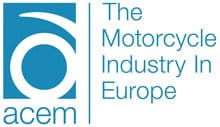
The latest OECD and CARE data1 show that motorcycle safety in Europe has improved over the last decades. The number of fatal accidents involving powered two-wheeler users decreased from 7,612 to 3.861 between 2000 and 2023, a reduction of 55%. In parallel, the fleet of powered two-wheelers has been constantly growing, from about 28,3 million vehicles in 2000 to more than 40 million in 2023, an increase of 36,5%.
Although these statistics are certainly encouraging, further efforts might reduce road fatalities and serious injuries to meet the safety targets set by the European Commission and the United Nations for the current decade. To this purpose, our industry is committed not only to manufacturing safe and advanced vehicles, but also to lay the groundwork for the future, through initiatives in connected mobility, high quality training and strong cooperation with key stakeholders. This document showcases some of our most important initiatives in the area of motorcycle safety.
However, industry actions alone will never be enough. We need to take a Safe System approach towards motorcycle safety, simultaneously addressing the human, vehicle and road infrastructure elements. A stronger level of engagement from the public sectors and civil society is needed.
We also need to continue promoting policies that enhance motorcycle safety not only in Europe but beyond. Our industry is actively supporting all initiatives within the International Motorcycle Manufacturers Association2 leading to safer motorcycling.
A combination of all these efforts will be instrumental not just in making Europe’s roads safer, but they will also help reap the considerable benefits that motorcycling brings to society such as, better access jobs and services through affordable mobility, reduced traffic congestion levels as well as sport, leisure and tourism enjoyment.
![]()
Michele Colaninno
ACEM President, CEO of Piaggio
1 The International Road Traffic Accident Database is an OECD It collects international accident, victim and exposure data on a continuous basis. 29 OECD countries, including 17 EU Member States, are covered in the database.
2 IMMA is the association which represents the manufacturing industry of powered-two wheelers at the global The association deals with a wide range of areas including global technical regulations, road safety policy, and vehicle construction requirements.


